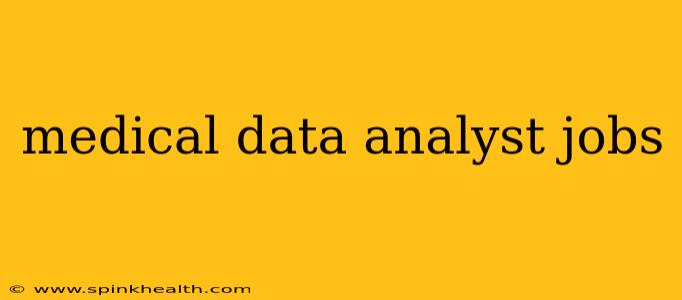The world of healthcare is undergoing a digital revolution, and at the heart of this transformation are medical data analysts. These unsung heroes are wielding the power of data to improve patient care, streamline operations, and drive groundbreaking research. But what exactly does a medical data analyst do, and what does it take to land one of these increasingly sought-after jobs? Let's unravel the mystery.
What Does a Medical Data Analyst Do?
Imagine a world brimming with patient records, clinical trial data, insurance claims, and countless other pieces of information. That's the landscape a medical data analyst navigates daily. They're detectives of the digital age, sifting through this vast ocean of data to uncover hidden patterns, trends, and insights that can revolutionize healthcare. Their work isn't just about crunching numbers; it's about translating complex data into actionable intelligence that improves lives.
One day, they might be analyzing patient demographics to identify high-risk populations for a specific disease. The next, they could be evaluating the efficacy of a new treatment by examining clinical trial results. They might even be working on predicting hospital readmissions to help improve patient outcomes. The possibilities are vast and constantly evolving.
What Skills Do You Need to Become a Medical Data Analyst?
Landing a medical data analyst job requires a potent blend of technical prowess and healthcare acumen. Think of it as a marriage of analytical skills and medical knowledge. Here’s a glimpse into the essential skill set:
-
Technical Skills: Proficiency in programming languages like Python or R is crucial, as is expertise in statistical analysis, data mining, and database management systems (like SQL). Familiarity with data visualization tools (Tableau, Power BI) is also a significant asset.
-
Analytical Skills: You'll need a sharp analytical mind to identify patterns, draw inferences, and interpret complex data sets. Critical thinking, problem-solving abilities, and a meticulous approach are paramount.
-
Healthcare Knowledge: Understanding medical terminology, healthcare regulations (HIPAA), and the intricacies of the healthcare system is vital. Experience working with Electronic Health Records (EHR) systems is a significant plus.
What are the different types of Medical Data Analyst jobs?
The field of medical data analysis offers a diverse range of career paths, each with its unique focus and responsibilities. Here are a few examples:
-
Clinical Data Analyst: These professionals focus on analyzing data from clinical trials and patient records to assess the effectiveness of treatments and identify potential adverse events.
-
Healthcare Data Analyst: Their role involves working with broader healthcare data, including insurance claims, hospital billing data, and public health statistics to improve operational efficiency and identify areas for cost reduction.
-
Biostatistician: These experts specialize in designing studies, analyzing clinical trial data, and interpreting statistical results to inform healthcare decisions.
How Much Does a Medical Data Analyst Make?
Salaries for medical data analysts can vary significantly based on factors such as experience, location, and employer. However, generally speaking, these positions offer competitive compensation reflecting the high demand for skilled professionals in this field. Entry-level positions might start at a certain point, while those with several years of experience can earn substantially more.
What Education is Required for Medical Data Analyst Jobs?
While a bachelor's degree is generally the minimum requirement, a master's degree in biostatistics, public health, health informatics, or a related field can significantly enhance your job prospects. Many employers also look for relevant certifications, such as those offered by SAS or AWS.
What is the job outlook for Medical Data Analysts?
The demand for skilled medical data analysts is soaring. As healthcare increasingly relies on data-driven decisions, the need for professionals who can effectively analyze and interpret healthcare data will only continue to grow. This translates to promising career prospects and a bright future for those entering this field.
Is a Medical Data Analyst Job Right For Me?
If you possess a strong analytical mind, enjoy working with data, and have a passion for improving healthcare, a career as a medical data analyst might be the perfect fit. It’s a field that offers both intellectual stimulation and the rewarding feeling of contributing to a better healthcare system. The demand is high, the opportunities are vast, and the impact is profound. So, if you're ready to crack the code of healthcare data, the time to start is now.

